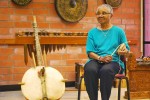Each week, Daily Bruin A&E will explore the instruments of the World Musical Instrument Collection and their performers that all contribute to the musical landscape of the UCLA Herb Alpert School of Music. This week, we highlight the West African gondze, a single-stringed lute fiddle comprised of horsehair, wood and lizard and goat skin.
To Jacqueline Cogdell DjeDje, the sound of the gondze, a West African fiddle, was a strange revelation. The professor emeritus in ethnomusicology first encountered the instrument in fall of 1973, when her professor suggested her to change focus of her doctoral research.
“Normally you associate the fiddle with European culture or maybe even Asian culture, but never with African culture,” DjeDje said.
When DjeDje stepped foot on the campus of the University of Ghana, she did not expect to switch dissertation subjects to the gondze from her original focus on the drums and dance. After all, she had only studied the fiddle for a term paper.
She never forgot the moment when she met her professor in Ghana, believing she would be studying the drums. But her professor had people lined up to teach her how to play the gondze, speak the language and take her to parts of the country to conduct fieldwork.
During lessons, DjeDje repeated every note by ear back to her teacher and eventually learned 10 songs, which she performed at a recital.
“I took lessons for an entire year,” DjeDje said. “It was all taught by tradition, by imitation.”
DjeDje said there are few people in the Western world who can play the royal instrument, also known by the Dagbamba people of Northern Ghana as the “wife of the king.”
According to a Dagbamba myth, there was once an insane king whose restless mind could only be put to ease with the help of the fiddler and his gondze. Through the music of the gondze, the fiddler and king’s intimate relationship blossomed.
“There was nothing they could do to make him be in his right mind,” DjeDje said. “So they decided ‘Why don’t we allow this fiddler to go and sing praises and chants for him?’ As a result of that, they felt so close to the fiddler and the instrument itself.”
When DjeDje returned to America in the spring of 1974, she stopped playing the gondze partially because she said she lacked guidance and did not have enough skill to keep practicing on her own.
She believes her teacher was disappointed in her because he taught her how to play in hopes of increasing awareness and popularity in the Western world so that he could travel and perform.
“For someone to go and come and play the fiddle is very rare,” DjeDje said. “I felt very sad that I was not able to successfully do the things he wanted me to do.”
Although DjeDje can no longer play the gondze, she has conducted extensive research on its history and usage and has even published books on it. After her teacher died in 2003, she kept in contact with his children through email.
“When I published my book (in 2008), I sent them a copy,” DjeDje said. “And the son said, ‘My father would be proud of you.’ That helped make my day.”
